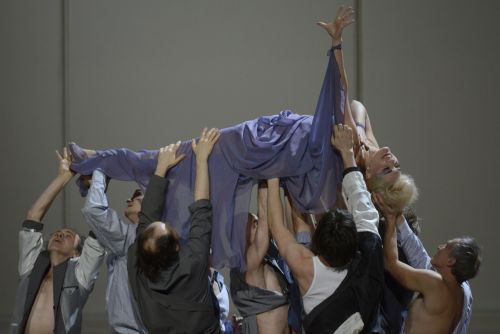 Germany Verdi: Simon Boccanegra, Staatskapelle and Staatsopernchor, Christian Thielemann (conductor), Dresden Semperoper 3.6.2014 (JMI)
Germany Verdi: Simon Boccanegra, Staatskapelle and Staatsopernchor, Christian Thielemann (conductor), Dresden Semperoper 3.6.2014 (JMI)

© Matthias Creutziger
Cast:
Simon Boccanegra: Zeljko Lucic
Amelia Grimaldi: Maria Agresta
Jacopo Fiesco: Kwanchul Youn
Gabriele Adorno: Ramón Vargas
Paolo Albiani: Markus Marquardt
Pietro: Andreas Bauer
A Captain: Christopher Kaplan
New Production
Direction: Jan Philipp Gloger
Sets: Christof Hetzer
Costumes: Karin Jud
Lighting: Bernd Purkrabek
The great attraction of my trip to Dresden was this Simon Boccanegra, due to the excellent cast and, especially, to the presence of Christian Thielemann on the podium. The result was worth the trip: a fantastic Simon Boccanegra.
There are not many opportunities to attend a performance of Italian opera conducted by Mr. Thielemann. The only exception I can recall was Manon Lescaut last year in Dresden. I don’t know how many years back one must go to find Thielemann leading Verdi, and I confess I went to the theater somewhat curious about what the outcome would be. I wasn’t able to attend last year’s Manon Lescaut so this was the first time that I saw him facing an Italian opera.
The result was exceptional: rarely have I seen a Verdi opera so well served. Some will continue to believe that a German conductor may have no place in the Olympus of the great current and former Verdi conductors, but that is a subjective opinion. After this Simon Boccanegra, may the Verdi Olympus include a spot for this superb maestro.
Thielemann’s reading was impressive with its clarity, nuances and strength. From the first notes of the Prologue, there was something different. If it were only the conducting, that would have been a lot, but there was more here. The four protagonists offered the best individual performances I’ve seen from any of them in any theater, which had much to do with Thielemann and not with coincidence. That’s where the great artistry of a conductor lies, when he ensures that all the performers under his command give the best of themselves, including the singers. With Mr. Thielemann, the Staatskapelle Dresden becomes something spectacular, and so it was on this occasion. What a difference between this and what one heard at the Semperoper the previous day! Something similar can be said of the choir, which was magnificent throughout the performance.
Zeljko Lucic, definitely one of the best baritones today, was Boccanegra. His suitability to the main Verdi baritone roles has been proven on many occasions, and this time he outdid himself. I’ve been fortunate to see him in this part in theaters such as Munich’s and Frankfurt’s, but the difference with his performance in Dresden was his ability to offer nuances beyond anything before. Mr. Lucic has shown here that he is a great singer.
Maria Agresta has become one of the best lyric sopranos, and she achieved this in a very short period of time. Four years ago she was unknown, and it was two years ago that I saw her for the first time in Valencia. Today she is almost a soprano of reference in the purely lyrical repertoire. It would be difficult to match her Amelia Grimaldi: she has a beautiful voice, very homogeneous, and is an excellent singer. Hers was a performance to remember.
Kwanchul Youn was irreproachable as Jacopo Fiesco, singing with much emotion throughout the performance. Even the vibrato which is so usual in his voice went unnoticed. From Il lacerato spirito until the final duet with Boccanegra, his Fiesco was impeccable.
I have to say that this was the most convincing performance I’ve ever heard from Ramón Vargas in a Verdi character. That his voice is beautiful is beyond dispute, and his Gabriele Adorno was excellent from start to finish.
There was also a fine performance from Markus Marquardt as Paolo Albiani. He can almost be considered a luxury in this character.
Dresden has mounted a new production by Jan Philipp Gloger, whose work is somewhat confusing but narrates the story correctly. The sets consist of a revolving stage with different modules. It is not particularly brilliant, but it works. The costumes combine a mixture of epochs which means that the ambitions, intrigues and power struggles seem as actual now as they were in 14th-century Genoa.
Mr. Gloger offers some interesting ghostly appearances by various characters who appear mutely on stage when the libretto refers to them, such as Maria Grimaldi, Amelia and Gabriele Adorno as children and even the old Giovanna, who looked after Boccanegra’s daughter. The most successful scene was the second part of the scene of the Council, which Gloger takes to the outside of the building, and it’s spectacular.
The surprise of the evening was that attendance barely exceeded 80% of capacity. Apparently, Verdi does not hold much appeal in Dresden. There was no applause during the performance as Mr.Thielemann never stopped the orchestra, wanting to give fluidity to the musical discourse. The final reception was triumphant for the four soloists, and mainly for Christian Thielemann, orchestra and choir.
José Mª. Irurzun
